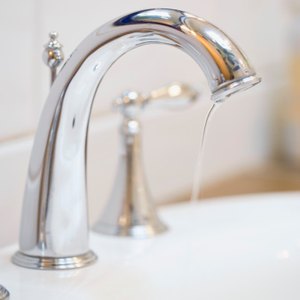
There’s not much you can do about lowering your city sewer charges, unless you’re a business, but there are many ways you can reduce your water use and bills. You’ll not only be saving money when you cut back on your water use, but you’ll also be helping the environment, depending on where you live.
Read More: 7 Ways to Cut Your Monthly Grocery Bill in Half
Does It Pay?
The average monthly water bill for a family of four living in the U.S. about was about $73 per month in 2019. Let’s say you can cut your water bill by $10 per month. That’s $120 per year.
If you can find nine other ways to cut $10 of expenses per month (e.g., groceries, lunch at work, coffee, TV movie rentals), that’s $1,200 per year. If you put these expenses on a credit card at 20 percent interest and carry those balances for one year, that’s brings your total spend up to $1,440 annually.
According to Calculator.net’s investment calculator, if you put this $1,440 into an investment that returned 6 percent annually for 30 years, you’d add almost $114,000 to your retirement nest egg. Do this for 40 years and you’d have almost $223,000.
Consider Also: W-2 Forms: What It Is, Who Gets One & How It Works
Use Green Appliances
One way to reduce your water bill is to purchase more energy-efficient appliances. Start with low-flow toilets and showerheads. Low-flow toilets save you enough money each year to pay for the toilet in two to three years, depending on how many people live in your home, if there’s a rebate program in your location and your water costs.
The U.S. Environmental Protection Agency estimates that a family might save $110 annually using a low-flow toilet. Teach your children not to use the toilet as a garbage can to save even more money.
Look for Energy Star-certified washing machines, dryers and dishwashers. You won’t save on water by replacing your water heater, but you’ll cut your electric or gas cost and might get a rebate on a new water heater – contact your gas and electric company to see what programs they offer.
Change Your Habits
Only do laundry and wash dishes when you have full loads. Use warm or cold water to cut your energy use and bills. It feels great to linger in a hot shower, but these binges can waste thousands of gallons of water each month. Put a timer in your shower, find out how long you need to shower to get clean, then use the timer each time you bathe. Don’t shave in the shower and don’t leave the water running when you shave or brush your teeth.
If you have an irrigation system for your lawn on an automatic timer, you might accidentally water your lawn during rainstorms. Add a sensor to your system so your sprinklers only go off when you need them. Talk to your landscaper about how often you need to water your lawn – it’s better to water deeper, less frequently.
The deeper you water, the lower the roots of grass grow, giving you a healthier lawn with less watering. You can also xeriscape, using less grass and more shrubs to create beautiful, environmentally friendly yardscapes. EarthEasy.com offers 45 ways to cut down on water use in your home and yard.
Read More: How to Start Saving Money When You Have None
Sewer Service Costs
Your city charges you to be hooked up to the municipal sewer system. While businesses might be able to negotiate reduced rates, homeowners generally can’t. If you’re a low-income resident, contact your city to find out if they have any programs that can help you reduce your costs in this area.
References
Writer Bio
Steve Milano has written more than 1,000 pieces of personal finance and frugal living articles for dozens of websites, including Motley Fool, Zacks, Bankrate, Quickbooks, SmartyCents, Knew Money, Don't Waste Your Money and Credit Card Ideas, as well as his own websites.

